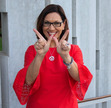My NAIDOC 2015 gratefuls (part one)
NAIDOC to me is about celebrating who we are: and here I am celebrating with Indigenous staff at DFAT (photo: Kate Kinsela)
In celebrating the theme of NAIDOC Week “We all Stand on Sacred Ground: Learn, Respect and Celebrate”, I took the opportunity in some of my public events to acknowledge the way that Aboriginal authors have written about sacred ground, wherever that may be. I wanted audiences to think about the way our writers talk about country; how land, place and space are addressed in Aboriginal literature in poetry, memoir, community histories and so forth. Quite often this writing shows how concepts of country are deeply connected to ideas of personal and collective identity
When non-Aboriginal Australians talk of “stories of place” with an Aboriginal context in mind, many immediately think of traditional stories, stories used by our old people to pass on cultural information and knowledge, or the history of a specific geographic region, and the significant sites of such areas.
In contrast to such expectations, when contemporary Aboriginal authors talk of ‘a sense of place’ and ‘connections to country’, many do so in terms of the 21st century environments we live in with a focus on the reality that many are urban dwellers. 32% of our people live in urban areas and it is estimated that one-fifth of the Indigenous Australian population lives in greater Sydney.
To read more about Aboriginal authors on writing about country you can download the BlackWords essays from AustLit. These were written with the assistance of the Aboriginal and Torres Strait Islander Arts Board of the Australia Council.
Below are some of my gratefuls for NAIDOC week and the events I was proud to be part of…
AATE/ALEA National Conference (Canberra)
My NAIDOC Week began with a literary breakfast at the War Memorial in Canberra, and a keynote address as part of the AATE/ALEA National Conference later that day. The theme of the conference was ‘Capitilising on Curiosity: ninggi warrguu –look and ask why’ and I was grateful for the opportunity to talk to educators about how best to embed Indigenous studies into the national curriculum. After a quick ‘test’ I showcased some examples of what I do in classrooms nationally. Some great connections were made with delegates, some who are keen to work with Rosie Scott and I on developing teacher’s notes for the Intervention Anthology.
AMSA National Convention (Melbourne)
A quick flight from Canberra to Melbourne and I was at the Australian Medical Students’ Association Convention where I learned that it was the largest student organized conference in the world, in history. That impressed me, and I take my hat off to Luigi Zolio Academic Co-Convenor and my contact for the event.
On the day, Luigi and his team had everything seemingly under control. I was grateful for the opportunity to present a version of my TEDx talk on ‘Sameness’ in a plenary session, and then conduct a workshop with students who were keen to do something creative. A highlight of the day was meeting Dr Brad Mackay from Embarrassing Bodies Down Under. A selfie at the airport was in order, of course!
DFAT (Canberra)
A quick trip back to Canberra (I really should have shares in the Qantas Club) gave me the extraordinary opportunity to meet with DFAT’s Indigenous Employment Network and then deliver the address. The numbers of Indigenous Australians working in Foreign Affairs particularly around policy and human rights impressed me no end. I felt honoured to be asked to address staff on issues I believe all Australians should be talking about: human rights, especially around what is happening in Western Australia and the closure of remote Aboriginal communities.
Ricky Macourt, moi, Danny Foulkes Moresau and Lachlan Strahan (pic: Kate Kinsela)
With thanks to Suzy Wilson-Uilelea (Assistant Director (Indigenous Programs), Ricky Macourt and Lachlan Strahan from DFAT and Sam Cook from the #SOSBLAKAUSTRALIA collective.
Flinders University (Adelaide)
I was thrilled to be invited to deliver the NAIDOC Week address at Flinders University co-hosted by Yunggorendi First Nations Centre with the School of Humanities and Creative Arts. 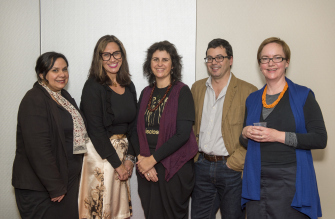 SImone Tur, moi, Natalia Harkin, Patrick Allington and Alice at Flinders
SImone Tur, moi, Natalia Harkin, Patrick Allington and Alice at Flinders
The evening gave me the chance to address staff, students and members of the community for NAIDOC Week on the theme We all Stand on Sacred Ground: Learn, Respect and Celebrate. On discussing the issue of the Intervention Anthology, I was grateful that local poet and contributor Natalie Harkin read her work “Intervention: A poem” from the book.
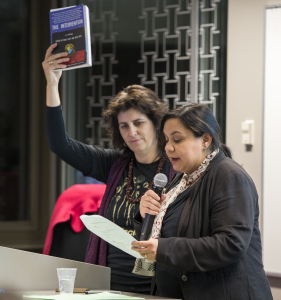 I’d like to thank Michelle Ah Matt, Natalie Harkin and Simone Tur (both pictured above) for participating for coordinating the evening, and to local writers Alexis West and Jared Thomas for coming along to support. (Pics: Ashton Claridge, Flinders University)
I’d like to thank Michelle Ah Matt, Natalie Harkin and Simone Tur (both pictured above) for participating for coordinating the evening, and to local writers Alexis West and Jared Thomas for coming along to support. (Pics: Ashton Claridge, Flinders University)
Randwick Amnesty (Sydney)
We carried the NAIDOC activities into the next week and on Monday July 12, and I spoke by invitation at the Randwick Amnesty group at Waverley Library. On a cold night I was warmed by the attendance of over 50 people who all came along to hear more about the Intervention anthology and #SOSBLAKAUSTRALIA A surprise audience member included my friend Barry Williams. We met at uni nearly 30 years ago and shared his experiences of living in the NT and then returning home to Bundjalung country up the north coast of NSW. Its nights like these that remind you that you are not alone in the struggle.
My Bundjalung brother Barry Williams – pic Michelle Ho
And NAIDOC also means spending time with my tiddas – thank you Michelle and Alexis XO


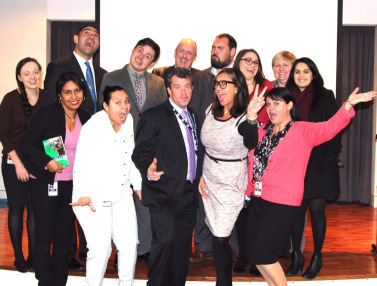
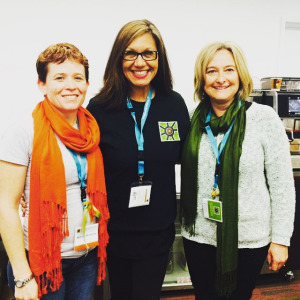
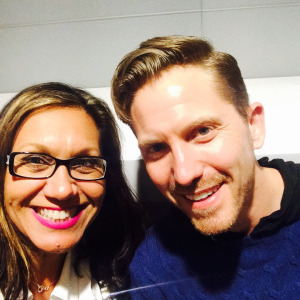
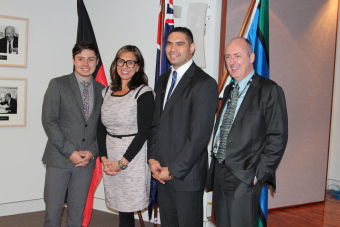
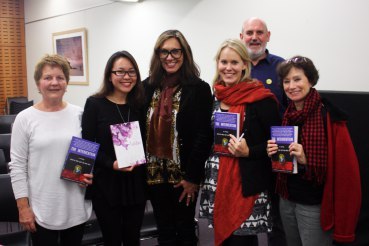
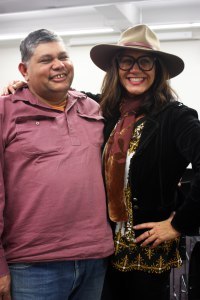
![FullSizeRender[1]](https://i.gr-assets.com/images/S/compressed.photo.goodreads.com/hostedimages/1437690147i/15615529.jpg)
![FullSizeRender[2]](https://i.gr-assets.com/images/S/compressed.photo.goodreads.com/hostedimages/1437690147i/15615530.jpg)
